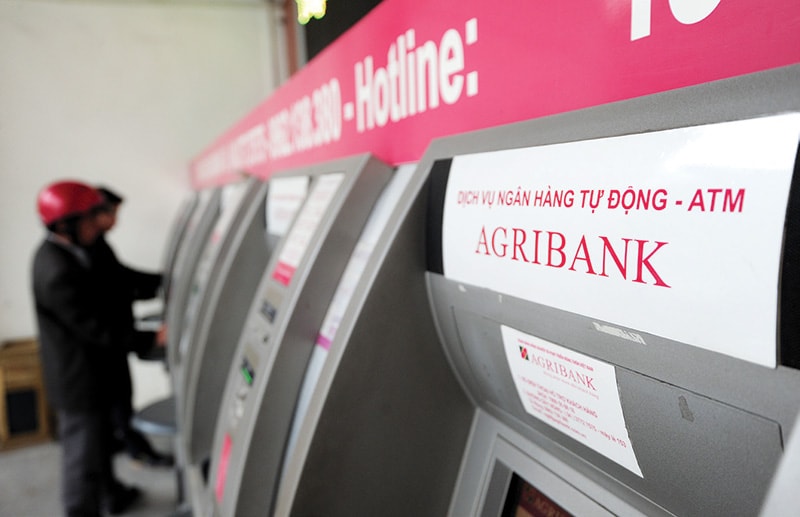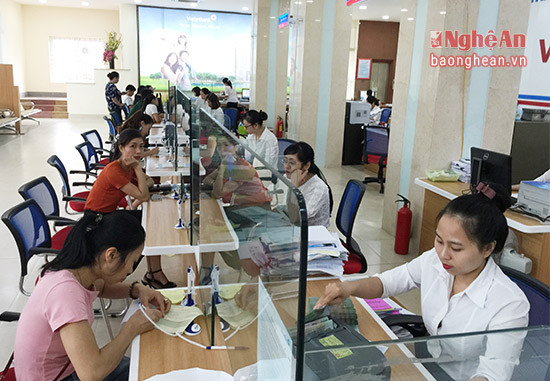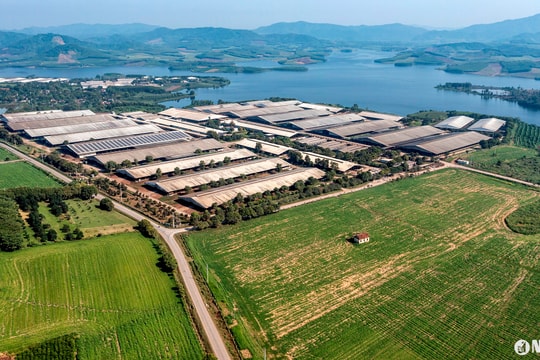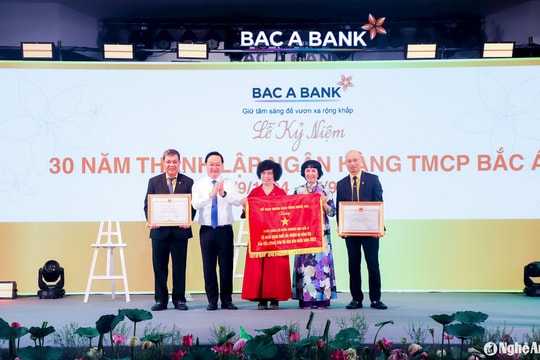Banks consider 'returning home'
Competition is fierce to attract urban customers, but many banks are leaving the rural market untouched. This is also the reason why the State Bank of Vietnam (SBV) has set a target of having 15% of its branches and transaction offices open in this area in the next 5 years.
Fierce place, desolate place
Talking to reporters, the leader of Agribank Dien Chau (Nghe An) said that at the intersection of Dien Chau town alone, there are nearly 40 commercial banks, and every few dozen meters you can see a transaction office of a bank. Meanwhile, in many rural and remote areas in Nghe An, you can't find any bank except Agribank and the Social Policy Bank.
Although our country's banking system is responsible for providing the main capital for the economy, it is worrying that the capital concentration is quite high, only concentrated in some areas, businesses and some areas with easy access to capital, while the majority of people in rural areas still cannot access banking services. Statistics show that currently only about 30% of Vietnam's population has a bank account (more than 36 million personal accounts), mainly concentrated in urban areas.
 |
| The majority of people in rural areas still do not have access to banking services. |
Mr. Pham Xuan Hoe, Deputy Director in charge of the Banking Strategy Institute (State Bank) said that in recent times, the banking industry has improved its ability to supply the economy, and banking service supply channels have developed. Specifically, the entire system has 9,787 branches and transaction offices; 16,937 ATMs; 222,831 POS machines. Each year, the entire system mobilizes over 6 million billion VND, with outstanding loans of 4.66 million billion VND (2015).
However, according to Mr. Hoe, only 20% of the rural population has access to bank credit. “The level of access to services by residents and businesses is not uniform by geographical area as well as business scale,” Mr. Hoe admitted.
On the commercial bank side, Mr. Pham Huu Tuan, Deputy General Director of Agribank, recommended that in order to further "popularize" banking services, commercial banks need to pay more attention to expanding their networks and arranging appropriate networks to improve their capacity to provide banking services.
Increase banking channels, cover rural areas
Currently, the country has nearly 10,000 branches and transaction offices of commercial banks, of which Agribank accounts for nearly 1/4. Many joint stock commercial banks have almost no network in rural areas.
To increase the economy's access to banking services, in September 2016, the Prime Minister issued Decision No. 1726/QD-TTg (Project 1726). One of the objectives of the Project is to increase the supply channel of banking services, bringing banking services to remote and isolated areas.
Mr. Pham Xuan Hoe said that the major goals of the Project are that by 2020, 70% of the adult population will open a bank account, there will be at least 20 branches/transaction offices/100,000 adult population, about 30,000 ATMs (40 machines/100,000 adult population). In particular, the Project also aims to have about 15% of branches and transaction offices of commercial banks open in rural areas. About 35 - 40% of adults in rural areas will deposit savings at credit institutions...
 |
| Transaction at Vietinbank Nghe An branch - Photo by Viet Phuong |
However, it is not easy for banks to "cover" the countryside. In recent years, many commercial banks such as BIDV, SHB, LienVietPostBank... have stepped up their activities in rural areas. The case of LienVietPostBank shows that, although it has "married" with Postal Savings, with the ambition of turning 10,000 post offices combined with banks nationwide into the largest network in the country, especially in the rural market, after 5 years of merger, the effectiveness of this network is still unclear. Particularly, lending through the post office channel of this bank in 2015 only stopped at a few thousand billion VND.
For many other banks, the shift to the countryside has only stopped at the district, town and township levels. Agribank is still the only bank that has established its presence in the rural areas.
According to banking experts, encouraging banks to move to the countryside to increase banking service coverage to the majority of people is a reasonable policy. However, before encouraging banks to move to the countryside, the State Bank needs to have a network plan to have appropriate allocation.
In addition, for banks with little experience operating in rural areas, establishing new transaction offices in this area is extremely costly and ineffective. Therefore, to exploit this market, banks need to find ways to apply information technology and telecommunications technology to create new products, services and sales channels suitable for people in this area.
According to Baodautu
| RELATED NEWS |
|---|








